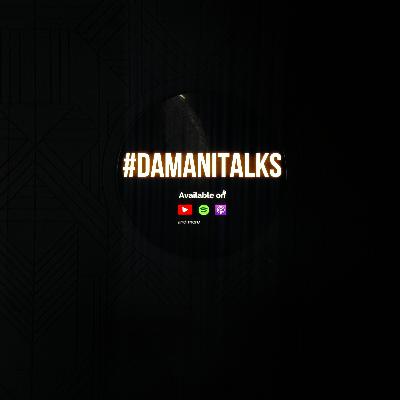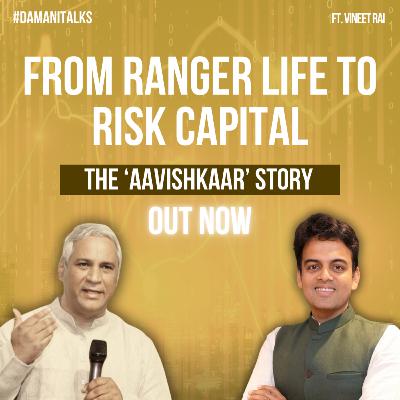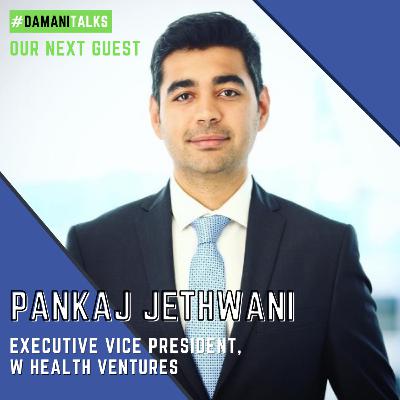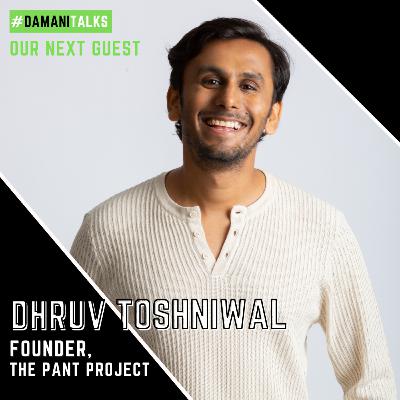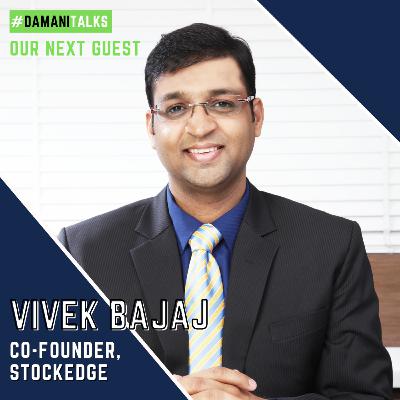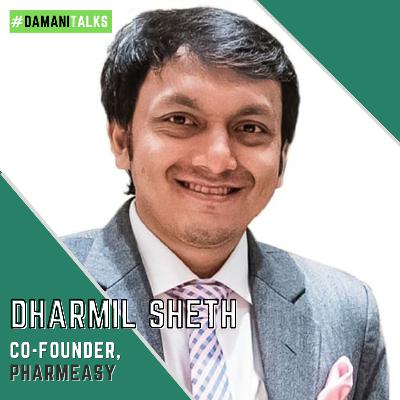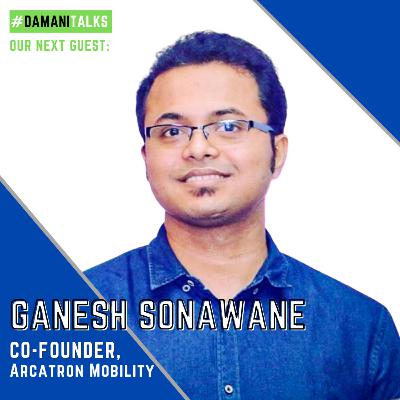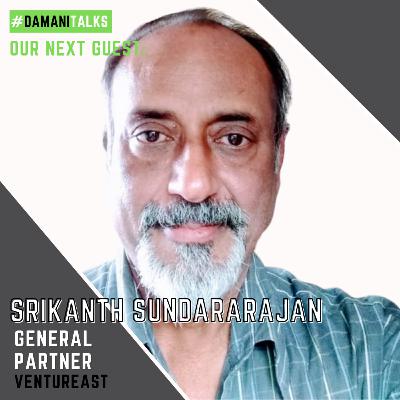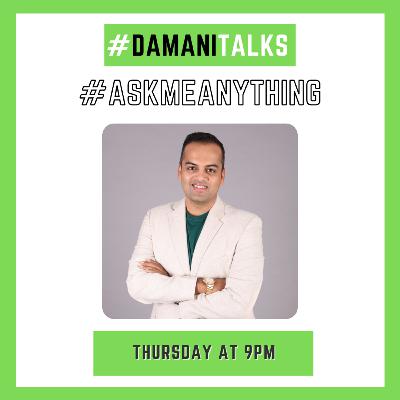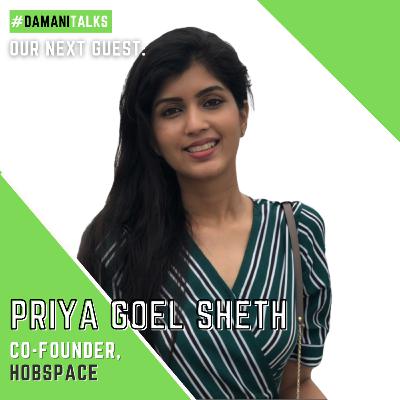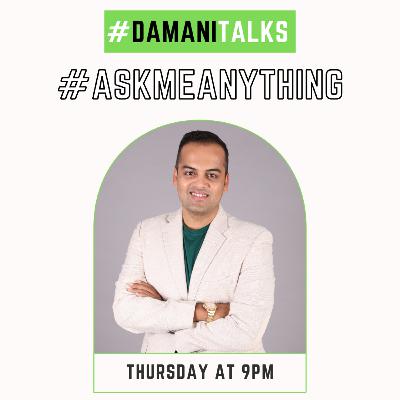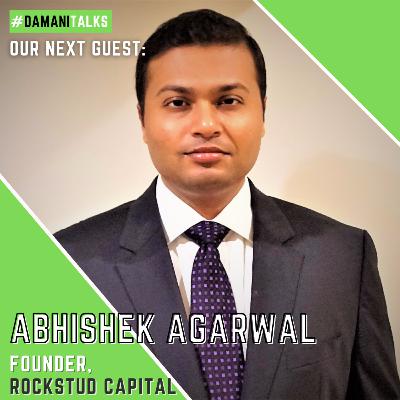Discover #DamaniTalks
#DamaniTalks

#DamaniTalks
Author: Anirudh A Damani
Subscribed: 5Played: 17Subscribe
Share
© Anirudh A Damani
Description
I look for exciting people doing unique things, often being entrepreneurs and people with startup experience.
Instead of just talking about 'what' they do, I want to bring out the 'why' behind what it is they do.
Live every week on LinkedIn, YouTube, Instagram, Facebook, and Twitter @showmedamani.
Instead of just talking about 'what' they do, I want to bring out the 'why' behind what it is they do.
Live every week on LinkedIn, YouTube, Instagram, Facebook, and Twitter @showmedamani.
74 Episodes
Reverse
Some conversations teach you.Some transform you. My talk with Nand Kishore Chaudhary (NKC-ji) wasn’t about business - it was about consciousness.He reminded me that leadership isn’t about control, but about connection. Since that day, I’ve rethought everything - from creation to consciousness to what success really means.Watch this episode of #DamaniTalks - it’s one of those that stays with you long after the credits roll.Highlights:Grew up in Churu, Rajasthan, and turned down a secure government job to follow his passion for people and nature through business.Defined business as “next to love” - a force to create and preserve civilization - and built Jaipur Rugs on this soulful philosophy.Empowered over 40,000 artisans, 85% of them women, by building trust in tribal communities and transforming them into extended families.Launched the award-winning Manchaha Project, enabling rural artisans to express their creativity and win global design recognition.Scaled Jaipur Rugs to a ₹1,000 crore brand across 90+ countries while preparing for an IPO rooted in purpose, not just profit.
What does it take to spot India’s startup wave a decade before it arrived, back the country’s earliest unicorns, and then pivot to building a climate-tech fund for the next generation?In this episode of #DamaniTalks, in conversation with Sandeep Singhal, one of the true OGs of venture capital in India. From a small-town upbringing in Kanpur to Stanford in the 1980s, to McKinsey in New York, and finally co-founding eVentures and Nexus Venture Partners, Sandeep has lived the evolution of India’s startup ecosystem - shaping how the VC industry itself took root here.Highlights:Growing up in Kanpur, stumbling into Stanford by chance, and his early Silicon Valley startup years.Why he returned to India in the late ’90s - long before it was cool - and co-founded eVentures, backing companies like MakeMyTrip.The origins of Nexus Venture Partners and the philosophy that grew it into a $2.6B powerhouse with iconic investments like Postman, Delhivery, Zepto, Snapdeal, Netmagic, Unicommerce, and WhiteHat Jr.Why he believes the real opportunity ahead is in climate, deep tech, and sustainability through his latest chapter at Avana Capital.This is a masterclass in long-term conviction, spotting patterns early, and building India’s entrepreneurial fabric brick by brick.
What does it take to go from selling carpets in Jaipur to becoming the first Asian Chair of TiE Global and now raising a $20M venture fund? In Episode 74 of #DamaniTalks, we are in conversation with Mahavir Pratap Sharma - an ecosystem builder, serial entrepreneur, angel investor, and now GP at Swishin Ventures. From his mother’s pioneering carpet business in the 1970s, to six years in America building a wholesale rugs and gems trade, to co-founding RAIN (Rajasthan Angel Innovators Network), Mahavir’s journey is one of constant reinvention. Along the way, he has backed 40+ startups, chaired TiE Global, and helped shape Rajasthan into a vibrant node in India’s startup map. Today, with Swishin Ventures, he’s institutionalizing that journey - launching a SEBI-licensed $20M fund to back seed-to-Series A startups solving for Tier-II and Tier-III India. His thesis: 51% of India’s startups are based in these cities, but they get less than 4% of VC capital. That imbalance is the opportunity. Highlights:Growing up in Jaipur’s carpet business, learning negotiation from his mother, and his take on ambition vs. conservatismSix years in the US: summer camps, basketball coaching, cold calls to carpet and jewelry buyers, and building his own import-wholesale ventureReturning to India and expanding into carpets, jewelry, events, and communicationsTiE Rajasthan: from reluctant member to global chair - and how a Jaipur retreat made him a household name in the ecosystemCo-founding RAIN in 2012 to plug Rajasthan’s funding gapFirst exits: Capacita Connect (3.5x), Hotify (4.5x) - and the confidence to go full-time into startupsThe Swishin Ventures playbook: seed-to-Series A, $200K–500K first cheques, consumer tech, BFSI, healthcare, and deep techWhy Tier-II/III founders are his bet for India’s next decade of unicornsWhether you’re a founder seeking your first cheque, an angel navigating misses and exits, or an operator wondering how ecosystems get built, this episode is packed with candid lessons on risk, resilience, and reinvention.
What does it take to build India’s pioneering impact-investing platform from a ₹5,000 bank balance, a cold email, and sheer conviction? In Episode 73 of #DamaniTalks, we delve deep into the 'Aavishkaar' story with Founder & Vice Chairman, Vineet Rai - from launching Intellecap and backing India’s earliest microfinance pioneers to buying a troubled NBFC with his own money and turning it around in 45 days. This is a masterclass in building institutions the hard way: brick by brick, cycle after cycle. At 25, Vineet became CEO of India’s first grassroots innovation incubator. A few years later, he raised capital off a living-room pitch, structured his first fund without lawyers, and made a ₹10 lakh first bet that ultimately returned 45x. Highlights:The ₹10 lakh first cheque that became a 45x exit and what almost went wrongHow a cold email to Singapore kickstarted Aavishkaar’s first commitmentsSurviving the 2010 AP microfinance crisis: from triple-digit returns to near zero - and back-Buying Arohan for ₹12 crore and turning it profitable in 45 daysThe “incubate + invest” playbook: Intellicap, talent pipelines, and building operating muscleWhy founders must “save themselves from themselves” as scale arrivesFund VI, professional leadership, and preparing for Fund VIIWhether you’re a founder, investor, or operator, this episode reframes risk, resilience, and responsible scale. Tune in for candid lessons, contrarian calls, and a rare blueprint for building institutions that last.
As #DamaniTalks completes its 50th episode, we bring you a leading personality from the Fintech industry - Shinjini Kumar, Co-Founder of SALT (mysaltapp)
She had a 17-year stint with the RBI, Paytm Bank, and later led Citibank's consumer bank for India – each role would make the holder proud – a position that one would retire from.
Yet, she found herself a challenge that got her jumping into the founder role.
Key takeaways from this episode:
Shinjini’s early days in Bihar. After studying English literature, what prompted her to move into the financial sector?
Shinjini took up the role of the payment at RBI; why did that space fascinate her attention? After 17 years at the RBI, what were her key takeaways from this experience? Would Shinjini encourage the youth to take up the challenge of working as a government employee?
How did Shinjini overcome the expectation mismatch on her job responsibilities at PwC? What was her experience like seeing the best of the corporate and government world?
Why was building a Paytm bank the next challenge for Shinjini? What was her experience working with Vijay Shekhar Sharma? What triggered her to to quit the payments bank just before the launch? What are her thoughts on Paytm’s IPO?
When did Shinjini know she wanted to quit her employment stint and take up entrepreneurship? Where did the idea of her startup - SALT germinate? How do the startup’s services cater to women?
How did Shinjini choose her investors? What are the differences between being an intrapreneur and an entrepreneur? Where does Shinjini see SALT in the next 5 years?
Shinjini’s book recommendation:
The Grapes of Wrath By John Steinbeck
Luck is when hard work, preparation, and perseverance meet with opportunity. Most founders get the hard work and perseverance right, but very few achieve all 3…
On the XLix (49th) episode of #DamaniTalks, we had 1 such rare founder!
Founder & CEO of WealthDesk, Ujjwal Jain's life journey is a series of forward-looking decisions that got him to founding a top-level fintech startup!
Key takeaways from this episode:
Ujjwal speaks about growing up in Kolkata, in a middle-class Marwari family. Why did he pursue engineering when he knew that Finance was his calling?
After Jadavpur University why did Ujjwal not pursue jobs with the likes of Google and Microsoft, and chose a stint with D.E. Shaw?
What does WealthDesk do, and what is WealthBasket all about? It took three years for the team to build the platform; when did Ujjwal know that he was ready to go live?
Why did full-service brokers like Motilal Oswal, JM Financial, Anand Rathi choose to partner with WealthDesk, despite being in a similar space? How is WealthDesk helping discount brokers like Paytm Money, Zerodha and Upstox? How is Ujjwal creating a “win-win” for all the different classes of brokers onboard?
How is WealthDesk different from competitors like - Smallcase?
How did Ujjwal convince his consumers to pay for a service that is otherwise easily available? How is Ujjwal building a brand name for himself?
How and why did Ujjwal decide to pump in his own $1M instead of raising funds? Ujjwal’s experience of raising $3.88M.
If Ujjwal could turn back time, what are the things he wishes to have done differently? Where does he see WealthDesk in the next 5 years?
As the heath-tech startup ecosystem sees increasing interest, funding, and valuations in India, We delved deep into a conversation with a Doctor turned VC investor for a refreshing perspective on the space!
Our guest Pankaj Jethwani, Executive Vice President of W Health Ventures, sheds light on the following:
What motivated Pankaj to become a doctor? What was his trigger to change from being a doctor to becoming part of Management? What is the value of an MBA from Wharton?
Pankaj’s experience in the non-profit, social & healthcare space. How did Pankaj get into Iora Health? What were the key differences between the healthcare space between India & the US? What was his experience like working in a high-flying US startup?
Pankaj’s background and role with W Health Ventures? What is W Health's investment focus? What areas is Pankaj looking at personally? Did Pankaj’s on-the-ground experience in healthcare and management consulting experience help him pick founding teams?
How does Pankaj choose the founders he wants to invest in? How does W Health Ventures help businesses, over and above the capital? What does he look for in a company before investing?
What is The Breakfast Revolution, and what does the program include? Over the years, Pankaj has served 2,20,000 children over 20 million fortified meals; how does he continue making such an impact?
How does Pankaj get the best mentors for himself? Pankaj’s advice to budding entrepreneurs. Where does Pankaj see W Health ventures in the next 5 years?
Pankaj’s book recommendations:
Venture Deals by Brad Feld
The New Business Road Test by John Mullins
Super Founders by Ali Tamaseb
The Great CEO Within by Matt Mochary
Most people believe that an affluent entrepreneurial family provides one a leg up in the entrepreneurial journey. But like any star-kid will tell you, these comparisons are for the outsiders who are looking in.
The reality for someone like Dhruv Toshniwal, scion to the Banswara Syntex family and now the founder of The Pant Project, is vastly different.
Watch this episode to learn:
Why did Dhruv decide to go abroad and study finance? How did his US experience help him in his entrepreneurial journey?
Why did Dhruv choose to move to Mexico from the US? What were his key learnings from this experience? What made Dhruv come back to India after spending 9+ years there?
What prompted Dhruv to start from the factory floor of his family business Banswara Syntex Ltd.? How does he grow an already established business? How is Dhruv steering the Banswara ship into startup-friendly waters? What were the opportunities he came across and what challenges did he face?
What was the idea behind building Dhruv’s first startup – Aanswr Fashion? What has been his experience working with his brother, and how do they decide the next pivot?
What is The Pant Project? Why did Dhruv decide to move from B2B to D2C? What is Dhruv’s go-to-market strategy? How are his brands co-existing with each other?
What’s the difference between TPP, Aanswr, and Banswara Syntex Ltd.? How does he balance running all three businesses?
Is Dhruv expecting to raise money, and from whom? Where does Dhruv see The Pant Project in the next 5 years and what are the areas Dhruv is investing in? What is his advice to budding entrepreneurs?
Dhruv’s book recommendations:
Zero To One by Peter Thiel
Antifragile by Nassim Nicholas Taleb
Bhagavad Gita
In 2020, the pandemic resulted in a 55% dip in students traveling overseas to study. How did this university admissions platform grow by 4x even during these trying times?
Our guest Akshay Chaturvedi, Founder and CEO of Leverage Edu has done it all!
Today, Leverage Edu has over 3 Mn monthly users, 75,000+ 1:1 counseling sessions & 2000+ admission applicants, every month.
Key takeaways from the episode:
Why did Akshay decide to work at AIESEC before his MBA? Why did Akshay decide to pursue an MBA? How did his ISB experience shape him into the person he is today? Why did he decide to join Draper University? What was the experience like getting mentored by top VCs of Silicon Valley?
How was it like landing a job at and working with one of the big four’s - KPMG? In just 7 months, Akshay received many awards here; how did he manage to create an impact in a short time? What is babajob.com? What was Akshay's role here? How did he get invited by Hon'ble Prime Minister as part of Committee formed for #India2022 Policy Building?
What was the trigger that took Akshay from roles in various ventures to starting out on his own? What was Akshay's first entrepreneurial stint? How was Akshay finding some of the best mentors like Vijay Shekhar Sharma to guide him?
How was Leverage Edu conceptualized? Why did Akshay decide to pivot from a platform that connects students with mentors to a university admission platform? What motivated him to start a business in higher education?
How does Leverage Edu cater to the government's changing policies? How did Covid impact their business operations? What is Uniconnect all about?
What was it like for Akshay to get his first fundraising round after 8 years? How does one get the 'who's who' of the Indian startup ecosystem to invest in your startup? What is Akshay's advice to budding entrepreneurs about fundraising?
What got Akshay to start investing in startups? What is he looking for in startups? How does Akshay maintain a balance between multiple things while building a startup? Where does Akshay see Leverage Edu in the next 5 years?
Vivek's book recommendations:
Shoe Dog: A Memoir by the Creator of NIKE by Phil Knight
The Everything Store: Jeff Bezos and the Age of Amazon by Brad Stone
The Sovereign Individual: Mastering the Transition to the Information by James Dale Davidson
Vivek Bajaj, co-founder of StockEdge impressed and convinced the crème de la crème of the VC universe to invest in his company, which was bootstrapped for a decade while charting impressive growth!
Today StockEdge is India's fastest-growing equity market and mutual fund research platform!
Key takeaways from the episode:
What was Vivek's role in JM financials? What was it like being the first commodity analyst for the firm and what led him to realize it was time to leave and start his trading desk?
What was it like to come back to Kolkata and start a trading desk? What was the feedback Vivek received?
What does Kredent mean? What were his key responsibilities here?
What was the thought process behind launching different startups together?
What does Elearnmarkets do? Why did Vivek pursue a freemium model and how did he manage to achieve a 3x growth rate during this period?
Where does Stockedge come in? What's the difference between Elearnmarkets and StockEdge? How is Stockedge benefiting traders and investors?
Did Vivek face any challenges post the covid outbreak? What was the feeling like when StockEdge got over 2 million app downloads on the play store and app store combined?
What was the need for Vivek to raise money? How did he get an ace investor like Ramesh Damani to invest in his startup? How does Vivek choose which strategic investor to get on board and when to bring them? How does he safely say no to investors?
What was the thought process like making a deal with Kotak securities? How did the deal happen?
What are the opportunities for Kredent as a brand? Where does Vivek see StockEdge in the next 5 years? What are the most common mistakes people make while investing? What are Vivek’s thoughts on the market, and how has he positioned his startup?
Vivek's book recommendations:
Zero to One by Blake Masters and Peter Thiel
Bloomberg by Bloomberg by Mike Bloomberg
Modern Monopolies by Alex Moazed
#DamaniTalks XLiv features Dharmil Sheth, co-founder of PharmEasy
Dharmil Sheth is a serial entrepreneur, who has built India's first health tech unicorn with a valuation of $4 billion – PharmEasy. Prior to PharmEasy, he founded BoxPlay Sports, 91streets and Ekagrata. Dharmil holds an MBA from the Institute of Management Technology, Ghaziabad.
The foundation of India's largest medicine delivery platform- PharmEasy, dates back to 2015 when Dharmil Sheth started a mobile application where users took a photo of their prescription and PharmEasy delivered their pharmaceutical requirements to their doorstep, at a 20% discount. Today, it is a unicorn with over 17 million active users and is worth $4 billion!
Key takeaways from the episode:
How did Dharmil’s internships at Techno Gravity Solutions and MakeMyTrip.com help him with his entrepreneurial plunge?
What did his first venture BoxPlay Sports provide? How was the idea behind Dharmil's 2nd venture-91streets born? What were the high and low points that eventually led to shutting down the company?
As a founder member, what gave Dharmil the idea to start Ekagrata? What is the vision behind Ekagrata? How does Dharmil balance his time between Ekagrata while building a billion-dollar company?
Why did Dharmil & Dhaval start PharmEasy? What were Dharmil’s early years at PharmEasy like? How does Dharmil differentiate PharmEasy's service from others and ensure longevity despite a competitive market?
What were the challenges in building a startup in one of the highest regulated industries in India? How does Dharmil manage that conflict between meeting the regulations and driving growth?
What was Dharmil's experience raising $872M over the years? If he were to define the elevator pitch for PharmEasy now, what would it be?
How did the Medlife acquisition impact PharmEasy? What transpired the deal of acquiring a publicly listed company- Thyrocare? Why did Dharmil choose to acquire when he has the bandwidth to build?
Where does Dharmil see PharmEasy in the next 5 years?
In this week's episode of #DamaniTalks I spoke to Kailash Katkar, Founder of Quick Heal a man who built a ₹1800 crore IT security company without a college degree!
Kailash created a global empire spread across 60+ countries starting from a small one-room bootstrapped computer repair services company – He has been an inspiration to many!
Key takeaways from the episode:
Why did Kailash drop out of school? Why did he decide not to pursue higher education? What sort of challenges did this bring about in his entrepreneurial journey?
How did Kailash's interest in repairing calculators come about? How did Kailash land his first job in a Radio and calculator repair store? What were the key takeaways from his experience here? What was the trigger that told him to leave and set up his own venture?
What did his first venture- CAT Computer Services, provide? Where did his interest in computers come from? What was the feeling like of generating a turnover of Rs.1 lakh after a year during that time?
Why did Kailash transition his company to Quick Heal? How did he convince his brother to join the company? Why was Kailash installing antivirus software on his client's computers free of cost initially? Apart from the antivirus software, what else did Quick Heal start providing?
Why did Kailash decide to pivot from hardware to software business? What are some of the most significant learning about running a B2B software business? What prompted Kailash to hire better managers for Quick Heal? According to him, what is the importance of getting the right managers in place?
Why was Kailash not able to take a bank loan during that time? Why did Kailash decide to take VC funding? What was it like raising money from Sequoia Capital in 2010? How did they add value to Quick Heal? What was the feeling like to be the first Indian cybersecurity company to be listed on BSE and NSE? Where does Kailash see Quick Heal in the next 5 years now? What is his advice to budding entrepreneurs?
Arcatron Mobility builds the next generation of innovative physical aid devices to enhance people's lives with limited mobility and elderly care needs. Last year Arcatron launched a premium range of products to COVID-protect its customers. The success of this new line has wholly revolutionized the trajectory of the company, with its product consistently featuring at the top of eCommerce store product rankings!
Ganesh Sonawane is the co-founder & CEO at Arcatron and is changing the game for those in need through his innovation. Before Arcatron, he was working with Bajaj Auto Ltd as an R&D Assistant Manager. Ganesh completed his Engineer's Degree from the National Institute of Technology, Calicut.
Key takeaways from the episode:
How did Ganesh's education help him in his entrepreneurial journey? Why did he decide to build an innovative wheelchair for his college project? Why did Ganesh refuse the grants to develop the design further during that time?
What was Ganesh's role at Bajaj? What were his key takeaways from this experience? Why was losing out on a 1st-year bonus at Bajaj Ganesh's favorite mistake?
What does Arcatron mean? How did Ganesh choose his co-founders? Why did Ganesh start Arcatron Mobility?
What was the experience like providing wheelchairs to military rehabilitation centers? How did Ganesh help Saravana Kumar- a national-level wheelchair table tennis player in his tournament?
What was COVID19's impact on Arcatron? What made Ganesh decide to expand his product portfolio outside of assisting the differently-abled?
How did Arcatron transform itself from a struggling business to one that is doing over $1m in quarterly revenues?
Ganesh's book recommendations:
The Hard Thing About Hard Things by Ben Horowitz
Influence: Science and Practice by Robert Cialdini
The Everything Store: Jeff Bezos and the Age of Amazon by Brad Stone
#DamaniTalks has completed a glorious year!
In last week's #AskMeAnything episode, I answered your queries on the journey of fundraising. From inception to the ups and downs to the teamwork and the moment when it all comes together!
Key takeaway's from the episode:
What should be the exact time of fundraising? Does the team size matter to the investors? Is it ok to approach seed round before launching the product?
Is it necessary for the founder to work full-time to raise the fund? How can solopreneurs raise pre-seed funding?
What is the ideal turnaround time for VC firms to invest in startups? Do founders have to create a prototype for fundraising?
How is raising money for a venture fund different from raising money for a startup? Are Indian LPs able to generate returns from funds in India?
What attributes have I found to be a good trait in startup founders? What are my thoughts on strategic investors? What are some tips for entrepreneurs on how to evaluate their potential investors? Scalability before Profit or Profit before scalability?
In this week's episode of #DamaniTalks we had Dr. Srikanth Sundararajan, General Partner at VenturEast. With over 33+ years of entrepreneurial and investor experience, he has had an impressive journey!
VenturEast is one of the longest-standing venture capital fund managers in India, investing since 1997 and managing close to $325+ million. They have 100+ investments in Technology, Healthcare, and Clean Environment
Key takeaways from this episode:
How did Dr. Srikanth's education help him develop managerial skills? What was his role at Hewlett-Packard? What made Dr. Srikanth chose this role and the company in 1988?
After working at Informix, why did Dr. Srikanth decide to leave and build something of his own? Where did the name Pretzel Logic Software Inc come from? What was the genesis of the idea? Why did Dr. Srikanth decide to move on from Pretzel after 9 years?
What was Dr. Srikanth's experience like having held CXO level roles at some of the biggest names in the technology space? When did he begin investing in startups? What was Dr. Srikanth's key learning from his time at Helion Advisors? Why did he leave Helion Advisors and start teaching in IIT?
Why did Dr. Srikanth decide to join Ventureast as a general partner instead of going out on your own? What are the exciting companies in VenturEast’s current portfolio? What are his focus verticals?
Dr. Srikanth’s author recommendations:
James A. Michener
Irving Stone
P. G. Wodehouse
This week on the Damani Talks episode, we had Munaf Kapadia joining us. Munaf is an entrepreneur, writer, digital marketing maverick, and the founder and “Chief Eating Officer” (CEO) at The Bohri Kitchen.
Munaf and Nafisa Kapadia have been instrumental in making The Bohri Kitchen a household name. This mother-son duo made Bohri cuisine famous by inviting patrons to their home on weekends, to enjoy home-cooked Bohri meals in a traditional Thaal.
Key takeaways from this episode:
What was Munaf's goal post-graduation at that time? How did his education help you in your entrepreneurial journey?
What was Munaf's role at Google? Landing a job at Google is a dream for most people; how did he get hold of this? What triggered Munaf to leave a well-paying job at the multinational giant and hack it out as an entrepreneur? What was Munaf's most significant takeaway from his journey with Google?
What was the idea behind TBK at the initial outset? How did Munaf go about getting your first set of customers?
How did Munaf spread the word into the Bollywood community? How did Munaf go about opening 6 delivery kitchen outlets in Mumbai? What were some of the biggest challenges?
How did the pandemic affect his business? What is the business model currently? What was the thought behind raising outside capital? If Munaf could change anything in his journey, what would it be?
Why did Munaf decide to shift his focus from TBK and look for a full-time job? What is the shift like from being the founder of a company to working for a fast-food giant like McDonald’s?
In these trying times, entrepreneurs are eagerly trying to define the "new normal" for their respective businesses. We have come across numerous queries on the fundamentals of maintaining business continuity in such uncertain times.
In this week's #DamaniTalks #AskMeAnything special episode, I tried to answer as many questions as possible on "How to maintain business continuity amidst the global pandemic"
Key takeaways from this episode:
What is the outlook for the next 3-12 months? What are my thoughts on cutting salaries? How much should the pay cut be? How should entrepreneurs curtail cost without downsizing?
What actions can be taken to meet the needs of the stakeholder and address doubts/concerns? Have the investor's expectations changed during the lockdown? Should founders look to hold off immediate fundraising aspirations?
How does one achieve work balance with the team while working from home? How to maintain the best communication line with your team virtually? What are the things that worked for me during this time, and what are the things that did not work?
What is the biggest mistake that founders make during this time? What is my view on some of the industries in the current scenario? What are the industries/verticals that I'm currently focusing on in the next 7 months?
HobSpace is a platform for extracurricular activities (online and offline) for kids between 3-14 years. The brand has partnered with schools and specialist trainers to provide training and conduct lessons based on children's hobbies and sports requirements.
Priya is the Co-founder of Hobspace and has over six years of experience working with corporate giants such as Goldman Sachs and S&P Capital IQ. After seeing an opportunity in experiential and cognitive building blocks-based models, she co-founded Hobspace, a platform to provide a holistic learning experience for children.
Here's what you can take away from this episode:
Why did Priya decide to pick up entrepreneurship? What were Priya's key takeaways from this experience from working at S&P Capital and Goldman Sachs? What was it like working for a fast-growing company?
What was Priya's role at Pharmeasy? What was it like for Priya to work with her husband? How did the inspiration for Hobspace come in when she was working for Pharmeasy?
What was the initial idea behind hobspace? How did Priya meet your co-founders, Harsh Jain and Bhaskar Raju Konduru? What was the skillset she was looking for in her co-founders?
How did the pandemic affect Hobspace? How was the shift from physical to virtual classes? How is Hobspace different from other extracurricular activity platforms?
What were the reasons behind the pivot? What are the steps Priya had to take while making the pivot? What was the discussion Priya had with the stakeholders (internal and external) regarding the pivot? What's the result today?
What are the different activities children can explore on Hobspace? How was Priya's experience of raising funds for the first time? Where does Priya see Hobspace in the next ten years? What's the next market she's looking at for Hobspace?
Founders of early-stage startups face many financial constraints at the onset. Mismanagement of personal finance is a common reason why many companies are forced to wind up their businesses. So, I'm here to help you out!
In this special episode, I covered the topic of 'Personal Finance for founders'
Takeaways from this episode:
Why did I choose this particular topic? What are some financial constraints that early-stage startup founders are unaware of?
How do early-stage startups protect against mismanagement of funds? How should one know which functions to not invest in that drain and might not yield a return?
Is it acceptable for founders building a product to do a part-time job? When should a founder start drawing his/her monthly salary? What parameters should early-stage startups use to decide the right salary for a founder?
Does getting a safe note affect valuation? How should one define what expenses should be expensed out from the company and what shall not? If a company is running on a freemium model, what is considered as traction for early-stage startups?
How much personal funding too much risk for a founder? At what stage can a founder look at becoming an angel investor? What are the cardinal rules of saving and investing when you're an entrepreneur?
What measures or precautions should a new or early-stage founder, with limited savings or personal funding to rely on, take? What are the common challenging monetary situations founders find themselves in?
Abhishek Agarwal is an angel investor-turned-fund manager with 13+ years in the Indian Financial Market and Start-up Ecosystem. He started his career as a research analyst and is now the Founder of Rockstud Capital. He has a proven track record of successfully investing in both Startups and Listed Equities space.
Rockstud Capital is India's first hybrid fund that invests in early-stage startups and listed equities traded on NSE in India.
Key takeaways from the episode:
What does Pioneer Investcorp do? What was Abhishek's role there? Why did he choose to specialize in the cement sector? How important was this role for Abhishek in developing his entrepreneurial career?
What was Abhishek's role in Fortune Interfinance? What was the switch like from a research analyst to a director? What were the challenges for setting things up in the family business? What was the trigger that told Abhishek that he must branch out on his own? How is being an intrapreneur different from being an entrepreneur?
What was Abhishek's first investment? Where is this company today? Why did Abhishek decide to move from investing and syndicating from angel networks to set up his own fund? how many investments did he make before starting Rockstud Capital?
How was the idea behind Rockstud Capital conceptualized? What does Rockstud mean? What was the genesis of launching a hybrid fund when the VC fund itself was a new concept in India? What was the whole experience like raising capital for the first time?
What was the thesis Abhishek was going after when he was looking to invest in companies? What was the most challenging startup that he invested in? What are Abhisheks top 2 favorites in listed equities and startups?
When should a founder press the accelerator when it comes to PR? After screening a bunch of startups, what's Abhishek's biggest advice to founders?



